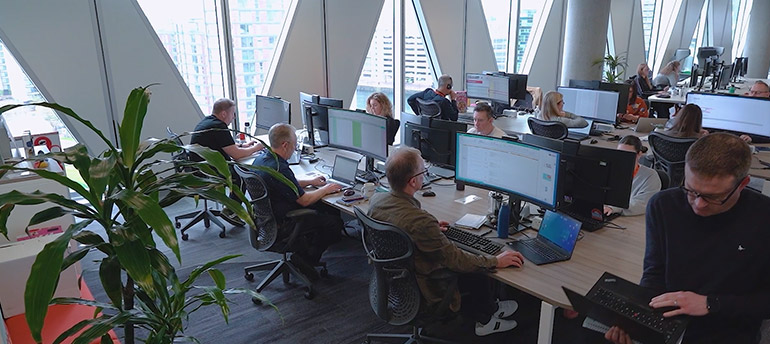Client story Occupational Health Provider Streamlines Software Development Lifecycle Through Full-Stack Automation
Occupational Health Provider Streamlines Software Development Lifecycle Through Full-Stack Automation
Story Snapshot
- Implement DevOps, reduce costs, accelerate new features and save developer time.
- Ensure test environments are more consistent and representative of the production environment.
An occupational health provider was looking to accelerate its software development lifecycle, increase productivity and improve testing before implementing new features on production, particularly in relation to its core health application.
Insight helped the client to:
By Insight UK / 20 Sep 2023 / Topics: Managed services , DevOps , Automation
Background
The organisation is a large occupational health provider in the UK that supports over 1,000 customers. Its core health application allows organisations to access its health and wellbeing services to manage employee healthcare.
The critical nature of the system meant the client needed to streamline its development process to optimise delivery.
Challenge
Previously, software testing processes for the organisation’s development team were manual and lengthy, with the provisioning of a new environment taking up to four days. This was significantly slowing down the development lifecycle and meant that adding new features to the health system was often an inefficient process. Manually creating these testing environments was also adding unnecessary costs.
The client wanted to start its DevOps journey but had few automated practices implemented. Therefore, the organisation needed guidance on how and where to adopt these best practices.
“Insight quickly understood our company’s needs, processes and infrastructure, and was therefore able to recommend an appropriate set of solutions that were delivered rapidly. This project has transformed our development team’s outputs by reducing the manual processes, producing significant cost savings and cutting time to market.”
Head of Development
“The health system is critical for providing healthcare services to thousands of our customers’ employees across the nation. This solution means easier access for customers and, ultimately, better patient care for employees.”
Chief Technology Officer
Solution and Outcome
Insight worked with the client’s development team to build an initial system that could be fully automated to produce repeatable and consistent test environments. The solution incorporated a variety of technologies to facilitate the end-to-end automation including Terraform, AWS Lambda, AWS EventBridge and Powershell. Insight then integrated the system into the organisation’s Continuous Integration/ ContinuousDelivery (CI/CD) toolset and provided documentation for its development team to operate, maintain and further develop the system themselves.
The project has hugely accelerated the client’s software development lifecycle and reduced its costs. Previously, manual provisioning meant it could take up to four days to produce a test environment. The new automated system has reduced this down to 20 minutes, meaning developers are able to spend more time producing new and innovative features across the platform.
The organisation’s developers can now test new features and code rapidly with minimal effort and greater confidence before deployment. The IT team’s focus is now on further extending and integrating the health system with newer technologies.
From an end-user perspective, clinical staff can now leverage the health system’s new functionalities, to better support their customers and their employees’ health and wellbeing requirements.
Why Insight?
Insight previously worked with the client on a migration project, moving its systems from on-premises servers to the cloud, also acting as a Managed Service Provider on an ongoing basis. It already had a strong understanding of the organisation’s systems and was ingrained within its processes.
As such, Insight was well-placed to offer the expert consultancy that the occupational health provider needed to implement DevOps best practices, as well as proposing an appropriate strategy to fully automate the process of provisioning and tearing down new test environments.
RESULTS
Cost savings
Cutting the time that environments are running produces a 60% monthly cost saving.
Time back
Reducing manual spin-up saves 90% of developer time, on an ongoing basis.
DevOps best practices
Insight provided expert consultancy to help the client implement DevOps best practices.
Full-stack automation
Reducing the time to produce a testing environment from four days to 20 minutes.



